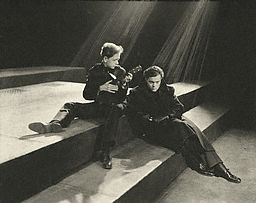 I’ve been wanting to write at length about Richard Linklater’s Me and Orson Welles ever since I saw it on a flight to California earlier this year. Now that the film is available on DVD, I’ve written a “Sightings” column for today’s Wall Street Journal in which, among other things, I talk in detail about the meticulous way in which Linklater and his collaborators have reconstructed the Mercury Theatre’s celebrated 1937 modern-dress production of Julius Caesar, no part of which, alas, was filmed at the time:
I’ve been wanting to write at length about Richard Linklater’s Me and Orson Welles ever since I saw it on a flight to California earlier this year. Now that the film is available on DVD, I’ve written a “Sightings” column for today’s Wall Street Journal in which, among other things, I talk in detail about the meticulous way in which Linklater and his collaborators have reconstructed the Mercury Theatre’s celebrated 1937 modern-dress production of Julius Caesar, no part of which, alas, was filmed at the time:
“Me and Orson Welles” is a coming-of-age screwball comedy in which Zac Efron, lately of “High School Musical,” plays a stage-struck high-school senior who unexpectedly finds himself playing a bit part in “Julius Caesar.” Don’t snicker: Christian McKay’s impersonation of Welles is so accurate as to be spooky, and despite the film’s obligatory (albeit charming) rom-com trappings, I’ve never seen a backstage movie that was truer to the experience of putting on a show.
What makes “Me and Orson Welles” uniquely interesting to scholars of American drama is that Mr. Linklater’s design team found the Gaiety Theatre on the Isle of Man. This house closely resembles the old Comedy Theatre on 41st Street, which was torn down five years after “Julius Caesar” opened there. Using Samuel Leve’s original designs, they reconstructed the set for “Julius Caesar.” Then Mr. Linklater filmed some 15 minutes’ worth of scenes from the play on the Gaiety’s stage, lit according to Jean Rosenthal’s plot, accompanied by Marc Blitzstein’s original incidental music and staged in a style as close to that of the 1937 production as is now possible.
I saw “Me and Orson Welles” on an airplane a few months ago and was floored by the verisimilitude of the results. No sooner did I get off the plane than I looked up the reviews, and was shocked to discover that none of the critics seemed aware of what Mr. Linklater had done. The only article that gave any sense of the film’s historical significance was by Simon Callow, Mr. Welles’ biographer, who flatly declared that Mr. Linklater “got it all right.” And so he did: You will never get any closer to the Welles “Julius Caesar” than by watching “Me and Orson Welles,” whose DVD version also includes a special feature comprised of footage of the reconstructed scenes, not all of which made the final cut….
Read the whole thing here.
* * *
Welles and the original Mercury Theatre cast of Julius Caesar recorded excerpts from the play for Columbia in 1938. To listen to this recording in streaming audio, go here and click on “Mar 1938 The Tragedy of Julius Caesar.”
The theatrical trailer for Me and Orson Welles:
